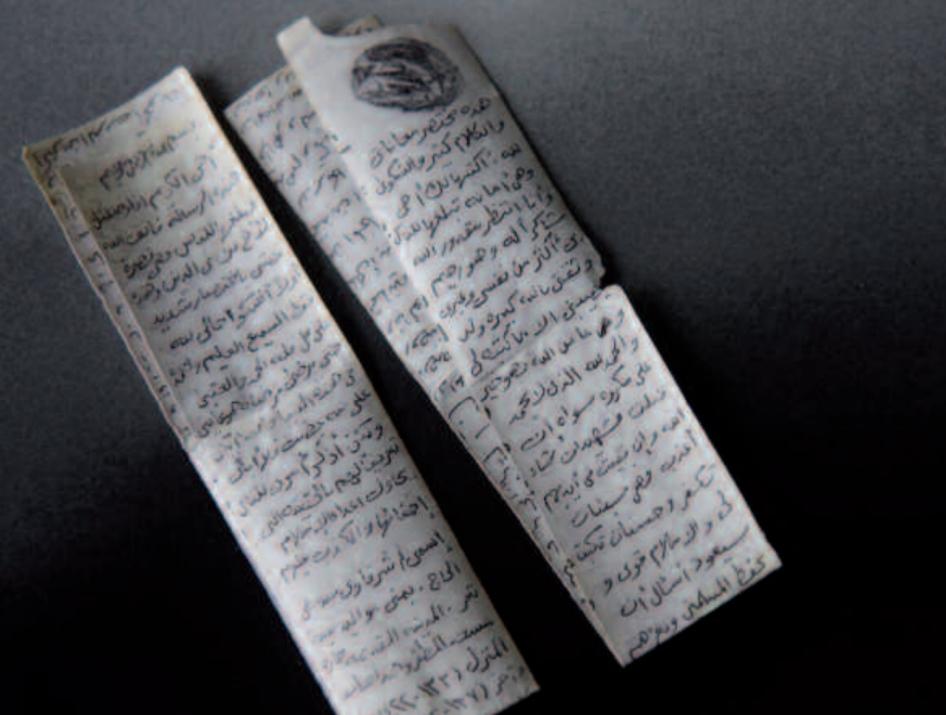The US Central Intelligence Agency (CIA) transferred at least 14 terrorist suspects to Jordanian custody for interrogation and torture since the September 11, 2001 attacks, Human Rights Watch said in a new report released today.
The 36-page report, “Double Jeopardy: CIA Renditions to Jordan,” documents how Jordan’s General Intelligence Department (GID) served as a proxy jailer and interrogator for the CIA from 2001 until at least 2004. While a handful of countries received persons rendered by the United States during this period, no other country is believed to have held as many as Jordan.
“The Bush administration claims that it has not transferred people to foreign custody for abusive interrogation,” said Joanne Mariner, terrorism and counterterrorism director at Human Rights Watch. “But we’ve documented more than a dozen cases in which prisoners were sent to Jordan for torture.”
Based largely on firsthand information from Jordanian former prisoners who were detained with the non-Jordanian terrorism suspects, the report describes eight previously unknown cases of rendition. The new cases include Ibrahim “Abu Mu’ath” al-Jeddawi, whose statements may have been relied upon as evidence in US status review proceedings at Guantanamo Bay, and Khayr al-Din al-Jaza’eri, whose alleged activities were mentioned in a high-profile terrorism prosecution in France. None are known to have been charged with a criminal offense.
The report also excerpts a handwritten note from one of the rendered prisoners, Ali al-Hajj al-Sharqawi, which he wrote while in Jordanian custody in late 2002. The note, which al-Sharqawi marked with his thumbprint, says that GID interrogators beat him “in a way that does not know any limits.”
The note continues: “They threatened me with electricity, with snakes and dogs .... [They said] we’ll make you see death .... They threatened to rape me.”
The GID appears to have systematically used torture and cruel or inhuman treatment against the detainees rendered by the CIA to Jordan. A common torture method was falaqa, by which prisoners are given extended beatings on the bottoms of their feet.
“Just about everyone at GID was beaten with sticks,” a Jordanian former prisoner told Human Rights Watch. “People were beaten on their feet. They did it in the basement.”
In a meeting with Human Rights Watch in Amman in late August 2007, senior GID officials denied that the GID had held prisoners rendered by the United States. They also denied that torture was practiced in GID detention. However, given the weight of credible evidence showing otherwise, their denials are unconvincing, Human Rights Watch said.
The exact number of people that the United States has subjected to rendition abroad is not known. CIA Director Michael Hayden suggested in a September 7, 2007 speech before the Council on Foreign Relations that far fewer than 100 people – “mid-range two figures” – had been rendered abroad since the September 11, 2001 attacks.
Human Rights Watch believes that the prisoners rendered to Jordan included at least five Yemenis, three Algerians, two Saudis, a Mauritanian, a Syrian, a Tunisian, and one or more Chechens from Russia. They may also have included a Libyan, an Iraqi Kurd, a Kuwaiti, one or more Egyptians, and a national of the United Arab Emirates.
These prisoners include five men currently held at Guantanamo Bay, Cuba – Ramzi bin al-Shibh, Hassan bin Attash, Ali al-Hajj al-Sharqawi, Jamal Mar’i, and Mohamedou Ould Slahi – as well as one man now believed to be in custody in Saudi Arabia: Ibrahim “Abu Mu’ath” al-Jeddawi. Ibn al-Sheikh al-Libi, currently in custody in Libya, may also have been held in Jordan for a time.
The current whereabouts of several other former prisoners are unknown or unconfirmed, though some of them were likely returned to their countries of origin, which include Syria, Algeria, and Iraq.
Human Rights Watch called upon the US government to repudiate the use of rendition to torture as a counterterrorism tactic and permanently discontinue the CIA’s rendition program. It said that Jordan should open an immediate judicial inquiry into the GID’s use of torture, ill-treatment, and arbitrary detention.
“Outsourcing torture is not only wrong, it’s illegal,” Mariner said. “And the US can’t say it doesn’t torture if it sends people to countries that do.”








